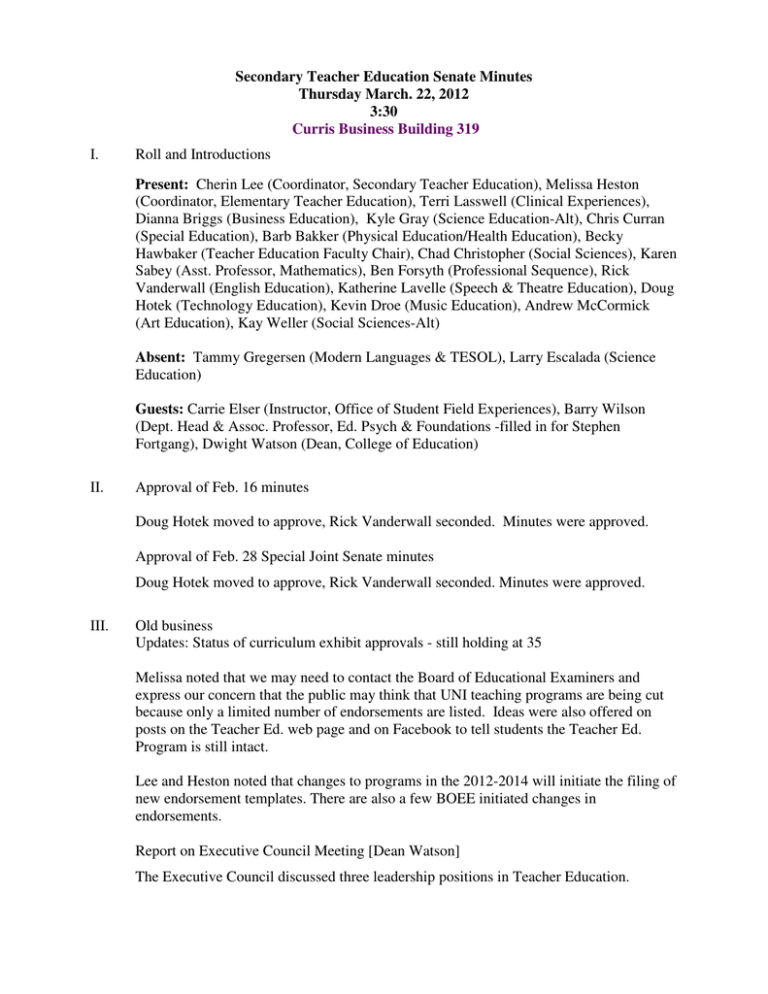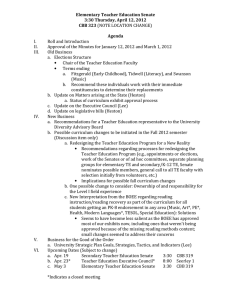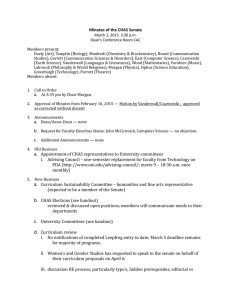Secondary Teacher Education Senate Minutes Thursday March. 22, 2012 3:30
advertisement

Secondary Teacher Education Senate Minutes Thursday March. 22, 2012 3:30 Curris Business Building 319 I. Roll and Introductions Present: Cherin Lee (Coordinator, Secondary Teacher Education), Melissa Heston (Coordinator, Elementary Teacher Education), Terri Lasswell (Clinical Experiences), Dianna Briggs (Business Education), Kyle Gray (Science Education-Alt), Chris Curran (Special Education), Barb Bakker (Physical Education/Health Education), Becky Hawbaker (Teacher Education Faculty Chair), Chad Christopher (Social Sciences), Karen Sabey (Asst. Professor, Mathematics), Ben Forsyth (Professional Sequence), Rick Vanderwall (English Education), Katherine Lavelle (Speech & Theatre Education), Doug Hotek (Technology Education), Kevin Droe (Music Education), Andrew McCormick (Art Education), Kay Weller (Social Sciences-Alt) Absent: Tammy Gregersen (Modern Languages & TESOL), Larry Escalada (Science Education) Guests: Carrie Elser (Instructor, Office of Student Field Experiences), Barry Wilson (Dept. Head & Assoc. Professor, Ed. Psych & Foundations -filled in for Stephen Fortgang), Dwight Watson (Dean, College of Education) II. Approval of Feb. 16 minutes Doug Hotek moved to approve, Rick Vanderwall seconded. Minutes were approved. Approval of Feb. 28 Special Joint Senate minutes Doug Hotek moved to approve, Rick Vanderwall seconded. Minutes were approved. III. Old business Updates: Status of curriculum exhibit approvals - still holding at 35 Melissa noted that we may need to contact the Board of Educational Examiners and express our concern that the public may think that UNI teaching programs are being cut because only a limited number of endorsements are listed. Ideas were also offered on posts on the Teacher Ed. web page and on Facebook to tell students the Teacher Ed. Program is still intact. Lee and Heston noted that changes to programs in the 2012-2014 will initiate the filing of new endorsement templates. There are also a few BOEE initiated changes in endorsements. Report on Executive Council Meeting [Dean Watson] The Executive Council discussed three leadership positions in Teacher Education. Melissa will stay on until Dec. 2012 as Elementary Teacher Education Coordinator. Barry Wilson will be retiring and Dianna Briggs will be stepping down. There will be formal internal searches for these positions. Barry will chair the Assessment Coordinator Committee. The committee will consist of people on the COE Premier Task Force. Barry will solicit others outside the COE. A new person needs to be on board by the end of this fiscal year. Dean Watson asked for thoughts about having summer support for an apprenticeship with Barry. Within the College of Education there will be an external search next year for two Department Heads. Dean Watson provided a general summary of how the Executive Council functions and described the PLS Transitions Teams that are in place. There will be 10 transition teams to assist with the PLS closing. The overall Management Team is comprised of President Allen, Provost Gibson, Brenda Buzynski and Dwight Watson. The K-12 Student Transition Team will focus on helping students and parents get what they need from administration and counselors. The Clinical Experience Team [Dianna Briggs, Becky Hawbaker, Nadene Davidson, Ben Forsythe, Chad Christopher, Melissa Heston, Cherin Lee, and Lynne Ensworth] will work on the process regarding field experiences so surrounding schools can allow Level II and portions of Level III to be absorbed into their systems. The R&D Team at present is composed of the Executive Council and will work on a new extended model across the entire college. The Employee Transition Team [ Provost Gibson, Virginia Arthur, Michelle Byers, Dwight Watson] will work with faculty and colleagues at PLS which includes tenured, probationary, revolving terms, etc. Another team will focus on the transfer of student records from PLS. How should the records be archived and where should they be stored? One committee will focus on the ceremonial details (documents) of graduates from PLS, another committee will focus foundational lines – donations, scholarships. The CDC (Child Development Center) Committee will work to find a new home for the center. Each sub team will create an information sheet, objective, intent, action steps, facts, actions. Leaders of each team will meet at noon on each Tuesday to create updates. IV. New Business Professional Sequence course information presentation: TEACHING 4170 Human Relations (Carrie Elser) Carrie provided copies of the Human Relations Syllabus. This is a state mandated course. The purpose of the course is to help students recognize their own biases and stereotypes. It builds on Meeting the Needs of Diverse Learners, adding the historical and societal frameworks. All students are individuals first; it is up to the new teacher to understand that you don’t pick and chose your students and the communities you work in. Carrie discussed the types of assignments in the course. Everyone that teaches this course has a different approach. The course includes experiences with diverse groups. The contact list is given to the students and they make the contact. A few examples include volunteering at the Salvation Army, the Hospitality House in Waterloo or tutoring at UNIcue. The experience doesn’t have to be education related. A question was asked regarding how many instructors are teaching this course and what the average number of students per section is. There are five instructors and the average number of students per section is 28-32. This is a 3 credit hour course and is required. It helps if students have had level II first before taking this course. Professional Sequence course information presentation: SOC FOUND 3119 Schools & American Society (Barry Wilson) This course is seen as an end-of-program course because students are in a better position to ask questions and entertain ideas about the sociology of education. Barry provided copies of the syllabus. The work expectations are detailed along with the objectives for each individual reading. This course requires an extensive amount of reading, thought and discussion. Students get actively involved in discussions. The average number of students per section is 36 and the number of sections is 7. It is a 3 credit hour course and the pre-requisite is junior standing and Level II courses. A question was asked regarding the history of why the course was changed from beginning level to end of program. The answer is that students aren’t ready to enter into discussions at that time. This is a course in which you engage students to learn but they also learn to question what they know and what they assume to be true about education, students, society, etc. A question was asked bout the cost of the books. The cost of each book is approximately $15-20. The book list varies between instructors; this particular syllabus listed 6 books. Discussion on transition team planning for clinical experiences (Lee and Heston) As per Chap. 79 - 80 hours of field experiences are required prior to student teaching. The Transition Team has been reconfiguring Level I and II and suggesting changes for Level III. The Level II structure for Fall 2012 requires students to block 2 or 3 hours of time for field experiences. The 8:00-10:00, 10:00-12:00 and 1:00-3:00 work well for secondary students. All Level II is going to be set up in Cedar Falls and closer Waterloo schools for a total of six weeks of field participation preceded by 2 weeks of on campus class. The Tues/Thurs. three hour block pattern will be hard for Music and Art. Level I will be in Waterloo and rural areas and may be capped at 300 initially. UNI support for Level II will include field coordinators and mentoring. For Level III the thought is to expand participation week for those doing an immersion experience to include true urban districts such as Kansas City, Chicago, and Minneapolis to minimize the demands on Level III within the Waterloo Cedar Falls Schools. Cedar Falls teachers were told by the Superintendent that they would get release time or stipends. Dianna Briggs said Provost Gibson indicated that we should raise the current fee for student teaching cooperating teachers. Iowa and Iowa State have higher support, the U of I is the equivalent of 1 graduate cr. hr. and ISU is $300+. UNI is $100 per 8 weeks Start thinking for the future: What do we want Teacher Education to look like for the next 25 years? We aren’t bound by the curriculum cycle. Note: There are 200 TWS to score and 97 TPA’s to score by April 13th. Chris Curran announced that the Special Education minors are initiating a Special Ed. Advisory Committee and would like to include a Secondary Senate member on the Committee. Please let her know if you are interested. Chris Curran moved to adjourn, Rick Vanderwall seconded. Meeting adjourned at 5:08 p.m. Upcoming Dates Apr. 5 Teacher Education Induction Convocation Apr. 10 Executive Council Meeting* Apr. 12 Elementary Teacher Education Senate Apr. 19 Secondary Teacher Education Senate May 3 Elementary Teacher Education Senate *Indicates a closed meeting 4:00 4:00 3:30 3:30 3:30 GBPAC Seerley 119 CBB 323 CBB 319 CBB 319

